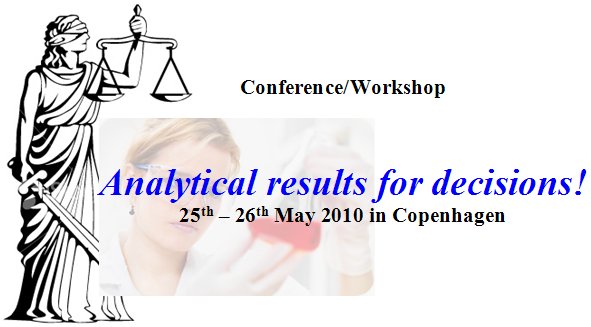Completed events
Analytical Results for Decisions (2010)
Date: 25-26 May 2010
Venue: Hotel Niels Juel
Organiser: L Sibbesen
Programme
Opening
Welcome and Introduction. L Sibbesen, Secretary, Eurolab Denmark
SESSION 1: THE ROLE OF ANALYTICAL LABORATORIES IN THE 21ST CENTURY
Chaired by: Prof. Arpad Ambrus
The significance of decision making in modern society. [Dr. Kyriacos Tsimillis, Pancyprian Union of Chemists, Cyprus (Chairman of Eurachem)]
The consequences for millions of people in our society are lying in the hands of the (relatively few) experts who are responsible for making the right decisions on the right basis!
EU legislation and Analytical Laboratories : business as usual? [Prof. Philip Taylor, EU Commission, JRC/IRMM, Belgium]
How are the potentials – and pitfalls – of the analytical laboratories seen in the light of the EU New Legal Framework?
Monitoring the limits – the importance of market surveillance [Chief Consultant Jens Ulrik Jensen, DI - Confederation of Danish Industry, Denmark]Consumers all around Europe rely on a tight system of market surveillance and for many product types the analytical laboratories plays a crucial role in that system. But how much checking is enough / too much?
Securing the basis for making the right decision: Correct understanding of analytical results [Prof. Paul De Biévre, Independent consultant on Metrology in Chemistry, Belgium]
You never get THE TRUTH – but what is actually an analytical result and how is it to be interpreted correctly and handled in the right context?
What can analytical results really tell?
Better understanding of the whole setting of making analytical measurements – from the procurement of a representative sample to optimizing the process for e.g. measure on very low levels in specific samples leading finally to a reliable result - incl. an uncertainty
Decision making – what more do we need than the analytical result? [Dr. Bertil Magnusson, SP Technical Research Institute of Sweden]
Uncertainty and compliance assessment. A brief presentation of the Eurachem Guide and the leaflet about "Use of uncertainty information in compliance assessment"
WORKSHOP 1: USE AND MISUSE OF ANALYTICAL RESULTS
Case Studies Theme: Use and misuse of analytical results!
SESSION 2: ANALYTICAL RESULTS FOR CONTROLLING LIMITS
Chaired by: Prof. Paul De Biévre
Setting the limits - how and why?What is the rationale behind setting up specific limit values and how is the uncertainty on the analytical results taken into consideration.
The principle of risk assessment in use of analytical results. [Chief Consultant MSc Arne Büchert, DTU National Food Institute, Denmark]
Making decisions is often a question of choosing the right balance between being sure and taking a risk of mistake - especially if you can never be 100% sure about the trueness of an analytical result
From microbial analysis to decision: the use of risk assessment[By Senior Scientist Maarten Nauta, DTU National Food Institute, Denmark]
Decision making in the area of microbiological food safety control largely depends on analytical test results, but these are attended by many uncertainties. How can we deal with that?
Where breaking the limits really matters. [Dr. Henk MJ Goldschmidt, Foundation DTC, Belgium]
Specifications in Clinical Chemistry! Making a diagnosis in the hospital based on results from the clinical laboratory can have consequences for life or death. Hear about the use of analytical results in the clinic.
Any limits for analytical results in research papers? [Associate Professor Dr.Sc. Jens E.T. Andersen, DTU Dept. of Chemistry, Denmark]
Results produced in research laboratories and published in scientific journals must stand the test of reliability.
Securing safe foods. [Prof. Arpad Ambrus, Hungarian Food Safety Office, Hungary]
What is safe – and what is not, looking at analytical results !!! Securing safe foods for the consumers requires a very wide range of different analytical procedures to test the possible undesirable contents (e.g. residues of pesticides). Some examples.
WORKSHOP 2: WHERE WILL THE LIMITS GO IN ANALYTICAL CHEMISTRY?
Case Studies Theme: Where will the limits go? Experiences - and ideas for the future

- Details
- Category: Completed events
- Last Updated: Thursday, 16 April 2015 13:26
